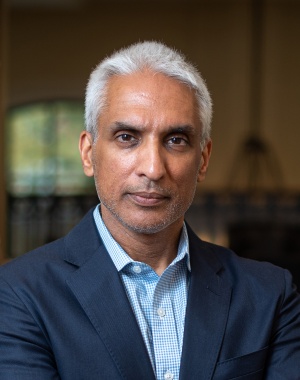Key developments in counterterrorism and national security since 9/11
Speaker
Secretary Michael Chertoff, Farah Pandith, and Eric SchmittDate & time
Location
This is a Virtual Event.The attacks on September 11, 2001 irrevocably changed how the United States conducts counterterrorism and national security operations. Join our expert panelists for a discussion of 9/11 and how it has shaped our international affairs landscape over the past 20 years. Panelists include: Michael Chertoff, former Secretary of Homeland Security; Farah Pandith, foreign policy strategist and first-ever Special Representative to Muslim Communities at the Department of State; and Eric Schmitt, journalist at The New York Times. Javed Ali, associate professor of practice at the Ford School, will moderate the discussion.
From the speakers' bios
Michael Chertoff served as Secretary of the U.S. Department of Homeland Security from 2005 to 2009. Secretary Chertoff led the country in blocking would-be terrorists from crossing our borders or implementing their plans if they were already in the country. He also transformed FEMA into an effective organization following Hurricane Katrina.
He is now the co-founder and executive chairman of the Chertoff Group, where he provides high-level strategic counsel to corporate and government leaders on a broad range of security issues, from risk identification and prevention to preparedness, response and recovery. Before heading up the Department of Homeland Security, Mr. Chertoff served as a federal judge on the U.S. Court of Appeals for the Third Circuit. Earlier, during more than a decade as a federal prosecutor, he investigated and prosecuted cases of political corruption, organized crime, corporate fraud and terrorism – including the investigation of the 9/11 terrorist attacks.
Farah Pandith is an author, foreign policy strategist, and former diplomat. A world-leading expert and pioneer in countering violent extremism, she is a frequent media commentator and public speaker. Her book is How We Win: How Cutting-Edge Entrepreneurs, Political Visionaries, Enlightened Business Leaders, and Social Media Mavens Can Defeat the Extremist Threat. She served as a political appointee under Presidents George H.W. Bush, George W. Bush, and Barack Obama, and most recently she was the first- ever Special Representative to Muslim Communities, serving both Secretaries Hillary Clinton and John Kerry.
She has served on the National Security Council, at the U.S. Department of State, and the U.S. Agency for International Development (USAID) in various senior roles. She has also served on the Department of Homeland Security’s Advisory Council, chairing its task force on countering violent extremism. She is a senior fellow with the Future of Diplomacy Project at the Belfer Center for Science and International Affairs at the Harvard Kennedy School as well as an adjunct senior fellow at the Council on Foreign Relations. In fall 2020, the Muhammad Ali Center named Pandith the first-ever Muhammad Ali Global Peace Laureate for her proven track record of and commitment to promoting diversity, cohesion and respect.
Eric Schmitt is a senior writer covering terrorism and national security for The New York Times. Since 2007, he has reported on terrorism issues, with assignments to Pakistan, Afghanistan, North Africa, Southeast Asia among others. He is the co-author, with the Times’s Thom Shanker, of “Counterstrike: The Untold Story of America’s Secret Campaign Against Al Qaeda,” published in 2011.
He was first appointed as a Pentagon correspondent for The Times in May 1990. Mr. Schmitt served this position until February 1996, and then again from Sept. 11, 2001, until 2006, covering issues of national security. Between 1996 and 2001, he worked as a domestic correspondent covering, among other subjects, Congress and immigration.
Mr. Schmitt has shared three Pulitzer Prizes. In 1999, he was part of a team of New York Times reporters awarded the Pulitzer for coverage of the transfer of sensitive military technology to China. In 2009, he was a part of a team of New York Times reporters awarded the Pulitzer for coverage of Afghanistan and Pakistan. And in 2017, he was part of a Pulitzer team that examined how Russian President Vladimir Putin projects power openly and covertly. He is a member of the Council on Foreign Relations.
